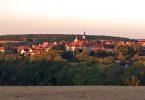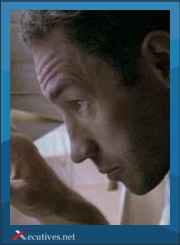
Nash Edgerton
Nash Edgerton, born 1973, started his film career working as a stuntman on several film productions. He worked on block-busters such as the Matrix trilogy, Superman Returns and Star Wars Episode II and III, in which he doubled for Ewan McGregor, in his role as Obi-wan Kenobi. Soon after, he started working as a film director. His short movies attained cult status. Bear, with talented Teresa Palmer is an amazing short film. Spider, one of his most typical short movies, has been watched over one million times – a considerable success. Nash Edgerton belongs, together with his brother Joel Edgerton, famous for several Hollywood film productions, to Blue-Tongue Films, a cooperative of younger Australian film talents. Blue-Tongue Films is a welcome guest at several film festivals around the world, including the Sundance Film Festival. Nash Edgerton has also worked on several video productions for Bob Dylan. He is director of The Square, a fantastic movie, based on an idea and script written by his brother Joel, in which both of them show great film talent. Both men can be compared with the brothers Coen and will surely bring more highlights in the future. Nash Edgerton is a special guest at the Basel Gässli Film Festival 2012. In his interview with Christian Dueblin, he talks about his career and his passion: making films. Read an interesting interview with a great film talent.
Dueblin: Nash, what are your first memories related to movies? Did you always want to be in the movie business?
Nash Edgerton: Well as a kid I didn’t really think of it as a real job, but I always loved movies. When I was about 10 years old, my Dad bought a video player – it was a Betamax. And a video store opened up down the street. That was my first memory of getting to watch movies that I wasn’t old enough to watch in the cinema. My Dad, at around the same time, bought a video camera and my brother and I would play with it and make little movies in the backyard.
Dueblin: Was it a kind of a common dream to produce movies with your brother?
Nash Edgerton: Oh, I don’t know. We had fun making them. We never really thought it was a job that we could eventually do. It wasn’t till after school when we had to actually think of something to do that it started to become something we pursued. But at the time when we were kids, it was just fun. I mean, it’s still fun, but it’s also our jobs.
Dueblin: Were there filmmakers who inspired you and your brother?
Nash Edgerton: Oh, yeah. I grew up at the right age with things like Star Wars and Jaws. Especially in the early 80’s it was those fantastical kind of movies that were so effective. And I also liked horror films, like John Carpenter’s films like “The Thing” and John Landis’ “American Werewolf in London”. Those kinds of movies really affected me a lot as a kid.
Dueblin: You have made a considerable career as a stuntman and as a director. Was the stuntman work an ideal medium to get into the movie business or was this a kind of vocation for you?
Nash Edgerton: Well at school I played a lot of sport and I was very physical and when I was 18 I got the idea that I wanted to be a stuntman. I had grown up watching a lot of TV shows like the Dukes of Hazzard and the Fall Guy and stuff like that. The idea of being a stuntman really appealed to me. And as a kid I was always jumping my BMX bike, jumping off the roof of the house and videoing it (laughs). I really got some interesting footage.
Dueblin: I bet your mother was shocked by that!
Nash Edgerton: Oh, yeah, for sure (laughs).
Dueblin: I have watched some of your short movies and I’m rather fascinated by them. I have also seen “Spider” and “Bear” and they remind me a little bit of short Greek dramas. All those movies lead into an exodus which combines humour but also with a serious approach. What’s behind those short movies?
Nash Edgerton: I feel like life is full of tragedy and humour. I feel that if I portray those situations as real as possible that they work in the same way life does: some people find them shocking and some people find them funny and some people are affected both ways by them. I like to make things that are entertaining and evoke an emotion out of an audience. Even if a situation is sometimes absurd, if you play them very real, it seems possible and it seems to get a good reaction out of the audience.
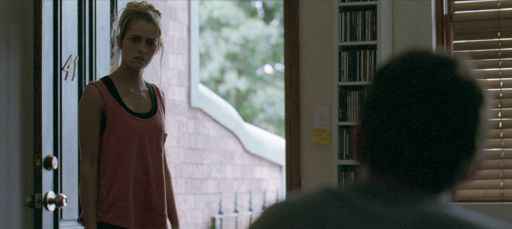
Teresa Palmer in „Bear“
Dueblin: I think in those movies there is an inherent kind of cult status. “Spider” has been viewed more than a million times, which is amazing.
Nash Edgerton: Yes, “Spider” has had quite a life. People responded to that way better than I expected.
Dueblin: How do you explain this incredible success?
Nash Edgerton: I don’t know. I was just very concerned that I would find it funny and entertaining for me and my friends. I didn’t realize that so many other people would get the sense of humour like all around the world. There are so many relatable situations in the film. You know, everyone has had a fight with their partner in a car, or there’s a fear of spiders and needles, very universal fears. Also trying to make up after a fight is very universal. There are a lot of universal ideas in there that make it relatable to people without going into specifics. Even when they’re fighting, you never know what they are really fighting about, it starts at the end of the fight and he’s just apologizing. So people put their own ideas on what the fight could be about. And the ideas in the shorts, they’re very simple which, again, makes them very accessible.
Dueblin: On the one hand, they are very simple, but on the other hand, you have to put a lot of information into such a short story. You have to feel the ambience and you realize what is happening between those two people. That can’t be easy to do…
Nash Edgerton: No, you are right, it’s not easy to do. I just try to do simple scenarios that are personal to me but are relatable to other people. Like the couple who wake up in “Bear” and the alarm is on his side and he refuses to turn it off. I try to do those scenarios without dialog and just get the sense of what the relationship is visually.
Dueblin: I have also seen the longer movie “The Square”. I’m also fascinated by this one, it’s a really good story. I like everything in that movie. Is this in a kind of way the logical consequence of your short movies? Is this the “big brother” of your short movies?
Nash Edgerton: I guess so, yeah. I’m fascinated by actions leading to consequences, karma and “what goes around, comes around”. That idea is explored much bigger in “The Square” where anything the lead character does comes back to haunt him. You know, in life you don’t ever really get away with anything. Eventually it catches up with you. Obviously in “Spider” it’s very immediate. He does something bad and it comes back to him very quickly. In “The Square” it’s the same kind of principle: this couple tries to hide their affair and it eventually becomes their downfall. It leads to the exodus as you mentioned it before relating to the Greek drama.
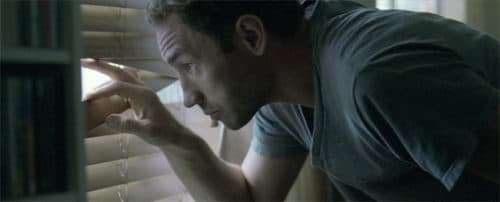
Nash Edgerton – Bear
Dueblin: I really liked that story, but I anticipated that there would be no luck for anybody there in that movie. What is the reason? They are both falling; everyone is falling and by the end of the movie, there is no happiness.
Nash Edgerton: Yeah. I like the idea of making something where you feel that something bad is going to happen. I think that creates a kind of tension in the audience – an anxiety. And you can’t help but watch it happen. It’s like a slow train wreck. You want to watch what’s going to happen even though you know it’s going to be bad. I like the idea of setting up that sort of feeling.
Dueblin: You worked as a stuntman on movies such as Matrix, Star Wars, I Am Number Four, Superman Returns… How did you get those jobs from Australia? And how did you profit for your own film projects by working as a stuntman for such great and big productions?
Nash Edgerton: Well, a lot of those films were shot in Australia. They we’re hiring local stunt performers for it and it’s a small community of stunt performers. I’d been doing it for a long time and you build up a reputation. So I would get jobs because I was the right age, the right size, or I had the skills that were required. You know, you do a job, and people like what you did on that one and the next time a film comes to town, people would say good things about your work and then you’d get a job on something else. A lot of times the bigger American films would come to Australia and American stunt coordinators would come here to work on them and I’d get to work for them. And then when I would go to America, I had connections with them so I would get to work on those movies.
Dueblin: So it’s the network that is working.
Nash Edgerton: Yeah, exactly, you know, and then as far as my own film making goes: being a stuntman on those movies sort of became my film school. You know I didn’t go to film school, but I got to work on movies and as I was making my own short movies at the same time, I would get to watch other directors make films from on the set of the movie. So I would learn on big movies and small movies. So it’s great, I still love doing stunt work for that reason, I get to work on other people’s movies without the responsibility of having to make it. I just have to do my part, but I still get to watch other people make films and learn from it.
Dueblin: Do you have the possibility of talking to the big actors, like Ewan McGregor and is it possible to share things and experiences on the set with them?
Nash Edgerton: Yeah, you’re working on a film and everyone is there together collaborating together to make the end result. Especially as a stunt performer you have to deal immediately with the actors, you are either performing stunts with them or for them or if they’re doing something physical, you’re there looking after them. Helping put pads on them, set the mats up or showing them how to do something, making sure they’re safe. You have immediate contact with the director, the actors and other crew members, because you’re a part of realizing the shots.
Dueblin: Your brother Joel is quite a star as well. He performed in lots of famous movies: Star Wars Episode III, Smokin’ Aces, King Arthur, The Thing. Is there a sort of competition between you and your brother or do you work as a team?
Nash Edgerton: We’re best friends, we work together a lot, I’m very proud of him. We’re very close, we talk all the time. We live together when we’re in the same town. We’ve got to work on a lot of projects together that either we’ve made ourselves or we’ve worked on other people’s films together. I’ve been his stunt double before. There’s no competition between us. I think we got all our fighting out when we were little kids.
Dueblin: Do you like it when people say that you are like the “new Coen brothers”?
Nash Edgerton: Oh, well, that’s very flattering you know (laughs). They’ve made a lot more movies than we have so far. Yeah we’re fans. They’ve made some great Film Noir and we wanted to make something like that.
Dueblin: You’ve set up a company: Blue-Tongue Films which is a sort of collective of younger Australian film makers. Can you tell me a little bit about how this came about?
Nash Edgerton: It came about because myself and the other people involved are very good friends. We’ve been friends for a long time and we all had similar interests in film making. It started out that we were each making short films and helping each other out on the films. You know, as a director it can be quite lonely when you’re making a film and it’s your responsibility to make the film as good as it can be. Just having friends doing the same kind of things and being able to help each other do it, it made you feel like you weren’t alone and that it was a possibility to be able make a film. I think it just formed naturally through our friendships and collaborating almost like a support network.
Dueblin: It is kind of like a gang — a movie gang there in Australia. You have done very interesting projects. You have also done some Bob Dylan videos as well. How did you get those jobs for this living music legend?
Nash Edgerton: Yeah, I did a couple of videos for Bob Dylan, it was great. His manager had seen some of our short films and these created opportunities. That was one of those examples.
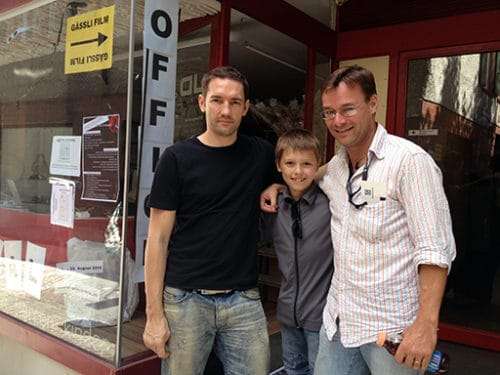
Nash Edgerton and Christian Dueblin in Basel
Dueblin: Nash you’re going to be in Switzerland as well and you’re supporting Giacun Caduff’s film festival. Why did you say yes to the Basel film festival?
Nash Edgerton: As a film maker it’s really great to go to other countries, to see your work play in front of audiences and people away from your own town and to see how audiences react. I like that this film festival is supporting young film makers and encouraging other people to make films. I feel like that’s how I got started. There were festivals in Sydney that were encouraging young film makers to make films. So I’m all for those kinds of film festivals.
Dueblin: What are your next film projects and your visions for the next couple of years?
Nash Edgerton: Well, my brother and I have been writing another film together which will be the second feature film I make. So the main project at the moment is to make another film. I just mostly like making new things and just love working on films and being involved in projects. Some of the other guys at Blue-Tongue Films are involved in making more films as well, so I’ll be involved in those projects. While people still let us make films, we’ll keep doing it.
Dueblin: Dear Nash, thank you very much for giving your time for this interview. I wish you all the best for your future projects and I look forward to seeing your next film.
(C) 2012 by Christian Dueblin. All rights reserved. Other publications require the author’s explicit consent.
______________________________
Links:
– IMDb




